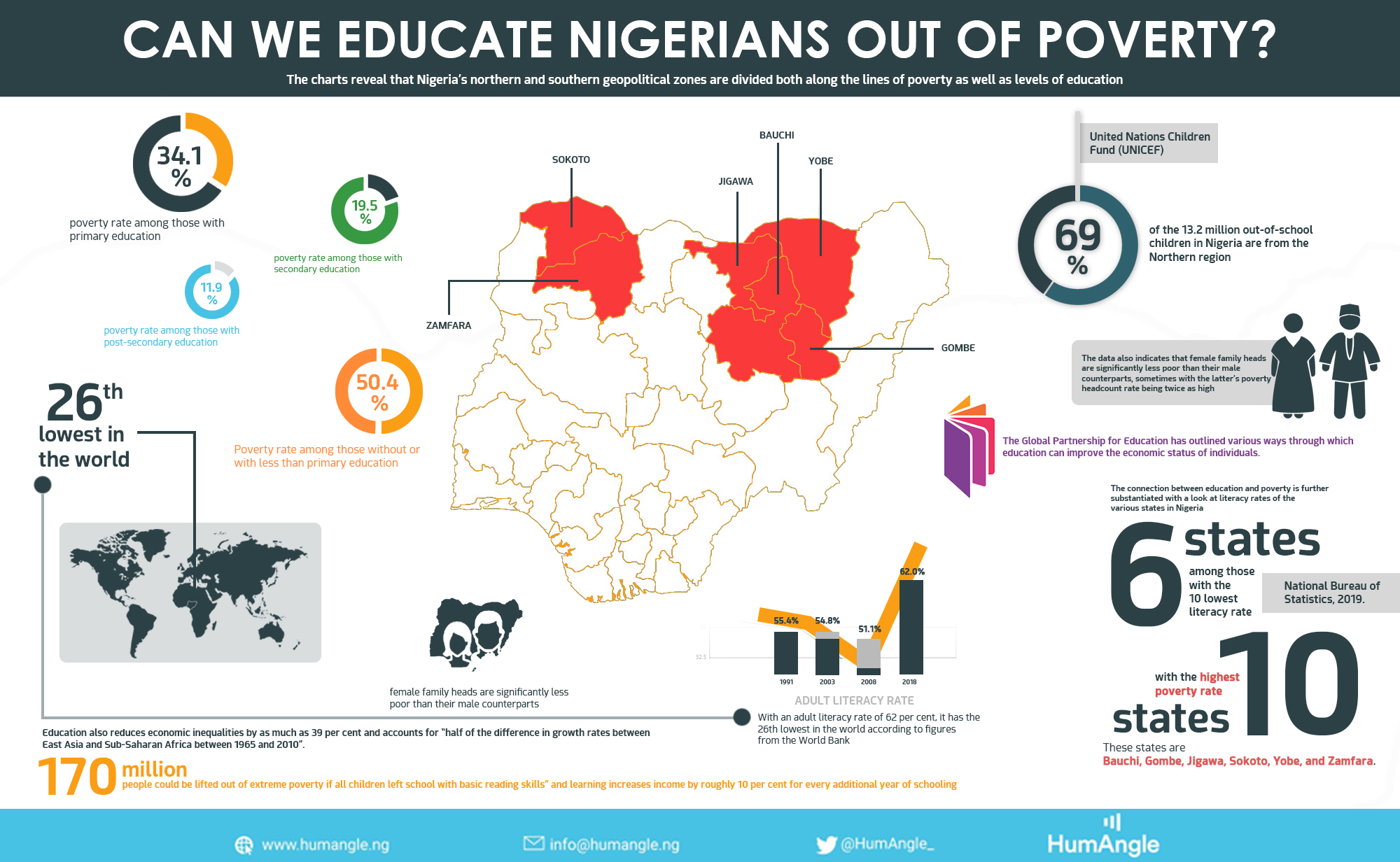Can We Educate Nigerians Out Of Poverty? What Data And Experts Say

The more educated a person is, at least up to the tertiary level, the richer he is likely to be, according to statistics recently released by the National Bureau of Statistics (NBS). Experts believe understanding this is key to effectively tackling Nigeria’s enormous poverty problem.
The executive summary of the 2019 Poverty and Inequality report made public on Monday, May 4, dedicates a section that breaks down poverty rates according to the level of education attained by the heads of households.
While among those without education or with less than primary education the poverty rate is 50.4 per cent, the figure reduces gradually depending on the level of education received.
The rate among those with primary education is 34.1 per cent, 19.5 per cent among those with secondary education, and 11.9 per cent among those with post-secondary education.

The data also indicates that female family heads are significantly less poor than their male counterparts, sometimes with the latter’s poverty headcount rate being twice as high.
Based on this trend and considering the country’s below-average education levels, it is not surprising that Nigeria has the greatest number of extremely poor people.
With an adult literacy rate of 62 per cent, it has the 26th lowest in the world, according to figures from the World Bank.
The connection between education and poverty is further substantiated with a look at literacy rates of the various states in Nigeria.
Six states among those with the lowest literacy rates, according to NBS , are also among the 10 with the highest poverty rates based on the 2019 report. These states are Bauchi, Gombe, Jigawa, Sokoto, Yobe, and Zamfara.
The two charts reveal that Nigeria’s northern and southern geopolitical zones are divided both along the lines of poverty and levels of education.
The United Nations Children’s Fund (UNICEF) states that 69 per cent of the 13.2 million out-of-school children in Nigeria are from the northern region. The World Bank also recently estimated that as much as 87 per cent of poor people in Nigeria come from the north.
According to Boniface Chizea, Managing Director of BIC Consultancy Services, one of the reasons for this problem is the almajiri educational culture in the north which does not encourage skill development and literacy in English language.
“I think we can have a formal setting where people will learn Qur’an, learn Arabic which drives their religion and will also be able to become better versions of themselves,” he said. “They will be able to read and write, and make decisions for themselves that are informed.”
The Global Partnership for Education has outlined various ways through which education can improve the economic status of individuals.
It estimated that “171 million people could be lifted out of extreme poverty if all children left school with basic reading skills” and learning increases income by roughly 10 per cent for every additional year of schooling.
It noted that eqducation reduced economic inequalities by as much as 39 per cent and accounts for “half of the difference in growth rates between East Asia and Sub-Saharan Africa between 1965 and 2010”.
Nigeria’s low literacy rate is not just the result of cultural limitations or a lack of interest, there is also the problem of inadequate access to affordable learning facilities, especially adult education.
In the executive summary of its 2010 National Literacy Survey, NBS noted that nearly half (47.4 per cent) of the illiterate adult population “would like to attain the status of a literate person”.
Majority of those interviewed asked for literacy centres to be located closer to the people. Other suggestions were more effective modes of teaching, creation of jobs upon completion of programmes, and provision of free learning materials.
Meanwhile, it is not a one-way street. As illiteracy is preventing millions of Nigerians from unlocking better economic opportunities, the lack of money also prevents people from attaining high levels of education.
“Most poverty alleviation programmes in Nigeria are failing. The failure affects education in the country. Poor facilities and lack of resources lead to schools collapsing,” observed Ahmad Hashim, Zamfara State Chairman of the Non-Governmental Agency for Literacy Support Services (NOLGASS), in January.
He explained that poverty damaged the lives of Nigerians such that they were deprived of basic needs, including education.
“There is poor accessibility of education in Nigeria. Some parents are unable to send their children to school because of their low income while some parents can only send their children to public schools because that is what they can afford,” he said.
“Basic needs are hard for some parents especially when hunger strikes deeply, penetrating into people’s lives.
“‘The compelling questions are: how can education take place when there is hunger? And how can the children learn when their stomachs are empty? How can the parents send their children to school when they are sinking in poverty?
“Private schools which are well equipped in terms of resources, facilities and materials are beyond their reach. This seemed to cause a big gap between the rich and poor and quality education. Hence, it can be said that education reduces poverty and education leads to national development and economic growth.”
Support Our Journalism
There are millions of ordinary people affected by conflict in Africa whose stories are missing in the mainstream media. HumAngle is determined to tell those challenging and under-reported stories, hoping that the people impacted by these conflicts will find the safety and security they deserve.
To ensure that we continue to provide public service coverage, we have a small favour to ask you. We want you to be part of our journalistic endeavour by contributing a token to us.
Your donation will further promote a robust, free, and independent media.
Donate HereStay Closer To The Stories That Matter




